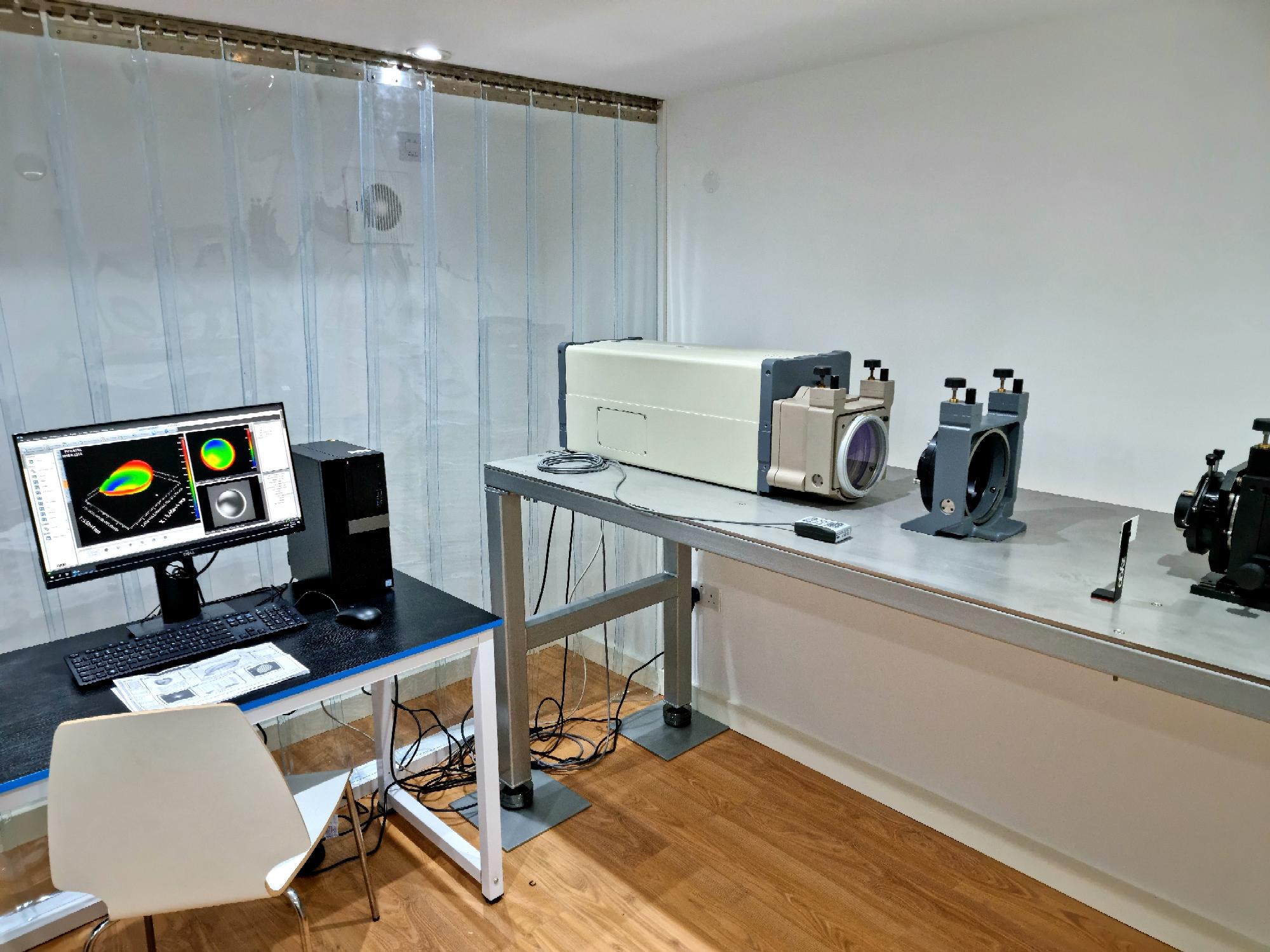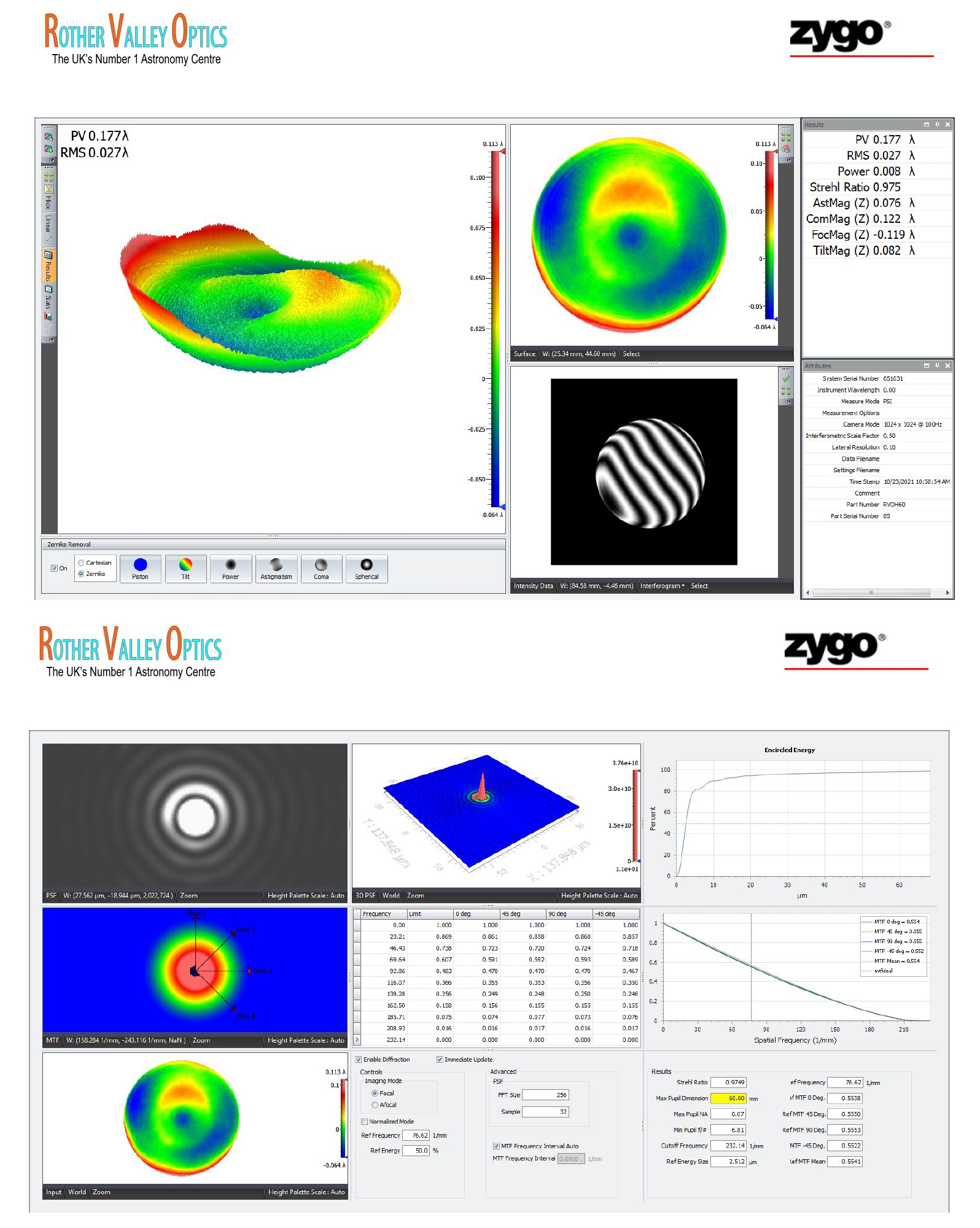Zygo Interferometer Testing For ED Refractor Telescopes!
We are extremely pleased to announce our Zygo Interferometer is now installed and ready for use! Our experienced staff can test refractor lenses up to 120mm aperture and provide a comprehensive 2 page report showing the optical quality and Strehl ratio, plus much more information. We are using the very latest Zygo MX software to provide a more detailed report compared to other standard reports.

The interferometer is essentially a measuring instrument. Within the interferometer is a calibrated laser that is pointed through the optical test surface, then onto a high quality reference sphere, then back through the test subject then to an internal camera which gives us the measurement on the screen. From this, we can adjust the position of the test optic and the reference sphere to obtain a perfectly calibrated system. The more central the laser to the test optic and then on return, the better and more accurate reading and measurement we can take. This takes a lot of adjustment to get the best results from the optical surface. Once the measurement has been taken, we are provided with a series of results that show the optical quality of the surface plus other information. Continue reading for an explanation of the individual values and you can also see a test report that was done on one of our RVO Horizon 60 OTAs.
We are offering certain telescopes with a Zygo test at an extra cost. Mainly ED doublets and triplets. All available telescopes with a Zygo test report are listed here. Just select Zygo Test Report from the drop down box at the top of the listing and we will test the optics in house and provide a full 2 page report with your scope. This will show you the optical quality of your telescope optics. We can also offer this service on your refractor telescope. Please get in touch for more details about this.
At Rother Valley Optics, one thing we pride ourselves on is customer service and quality of our equipment. When we test your telescope, we will ensure that it is of the highest quality otherwise, we will reject the scope under our strict quality control and test another model for your peace of mind. One of the main values to look at when testing a refractor is the Strehl ratio. The higher this number, the higher quality lens you have. At Rother Valley Optics, we will guarantee the highest possible Strehl ratio for your telescope. We will aim to provide 0.95 Strehl or higher on Takahashi, RVO Horizon, William Optics and many more! Generally, the higher the Strehl ratio, the lower the Astigmatism and Coma meaning a better image quality from your instrument.
Other measurements such as the PV and RMS are important too. With these measurements, the lower the number the better as it shows less curvature on the lens. The flatter an optical lens, the better it will perform. The PV rating (Peak To Valley) is a measurement from the highest point (Peak) to the lowest point (Valley). From this we get the RMS (Root, Mean, Square). This is a similar figure to the PV and measured exactly the same way. The RMS is basically an average height difference from the PV so again, the lower the better. As you can see form the example below, we measured an RMS of just 0.027 wave which is a very good value.
We also measure the Power with our systems which is essentially the error from the reference sphere to the test optic. The reference sphere we use on our system is a very high quality sphere so the closer to zero the Power, the less error between the 2 elements thus ensuring a higher quality optical surface.
You will also see some more values such as Astigmatism and Coma. Again, these are measured by the interferometer when we take measurements of the optical surface after adjustment. These are values which ideally would be at 0 but as our test optics are all curved lenses, there will always be astigmatism and coma present. The lower the number, the less of these aberations you will effectively see but with most refractors, you can buy field flatteners which will compensate for the coma anyway. The astigmatisms value is explaining the error between the symmetrical curvature of the lens. Basically, no lens will be perfectly symmetrical, the lower the astigmatism, the more symmetrical the lens surface is.
Once the Zygo test report has been completed, the optical alignment is thoroughly tested and tuned to ensure they are spot on before they leave us.
All available telescopes are on the website at the link below and ones we've tested already that are available straight away are also listed.
https://www.rothervalleyoptics.co.uk/zygo-tested-refractors.html
Here is an example of the test what we provide. This was a test on one of our Horizon 60 ED OTA's.

For any questions about this amazing new service, please either call 01909774369 or email sales@rothervalleyoptics.co.uk.



















 Fast & Reliable Delivery
Fast & Reliable Delivery Helpful & Friendly Staff
Helpful & Friendly Staff Best Prices Online
Best Prices Online 100% Secure Shopping
100% Secure Shopping